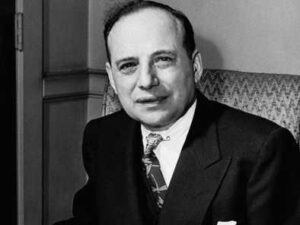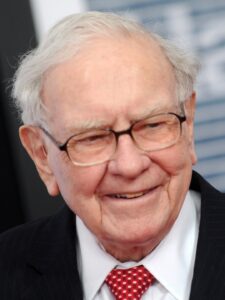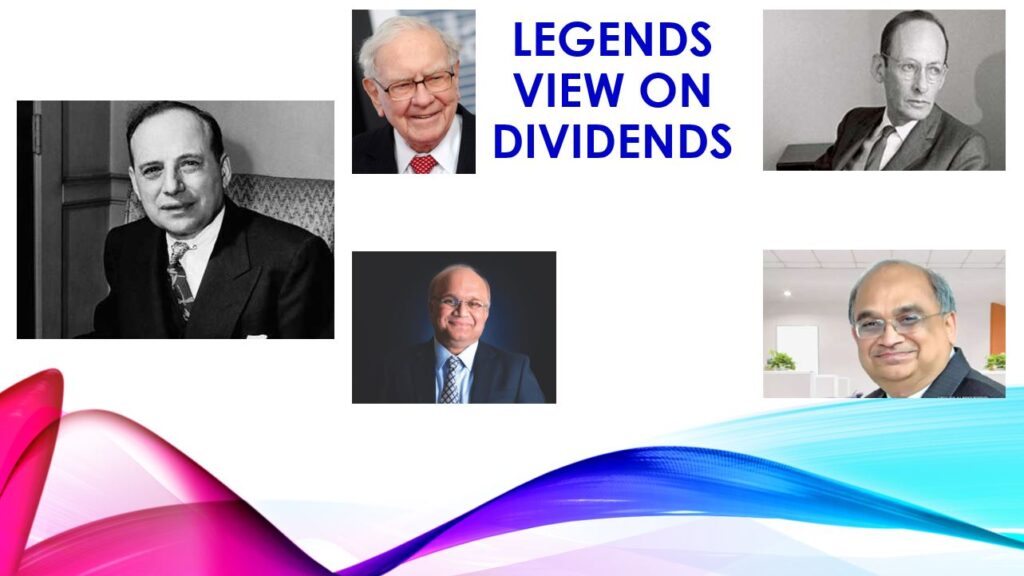In our previous two blogs, we delved into the fundamental principles of dividends and the pivotal role of dividend analysis in shaping investment decisions. In this blog, we turn our attention to the perspectives shared on dividends by renowned investing legends.
Why, you may ask?
- Well, there is always a wealth of wisdom to glean from the experiences of successful investors.
- These financial luminaries have generously imparted their views on dividends and their significance, offering valuable insights to help us effectively incorporate them into our investment framework.
However, it’s important to exercise caution, as these investors hail from diverse geographical locations and eras, some dating as far back as a century. Their realities may markedly differ from our contemporary landscape, and their viewpoints may even contradict one another. Therefore, this isn’t a one-size-fits-all approach but rather an opportunity to enrich our investment perspective with a diverse range of ideas.
Hi, This is Venkatesh. I write on Personal Finance, Stock Investing, Productivity and Time Management. You will be interested to read more about me and the purpose of my website.
If you are interested in these topics do subscribe to my blogs. You would maximum receive 4 to 5 emails a month. Do check my Blog Index page for all my blogs.
Benjamin Graham
Benjamin Graham is widely known as the “Father of Value Investing”. One of his students who went to receive substantial success in the world of investing is Warren Buffett. Others include Irving Kahn and Sir John Templeton. He has written two classical books on investing: (1) Security Analysis and (2) The Intelligent Investor.

Benjamin Graham offers an insightful perspective on dividends in his book “Security Analysis.” Here are the key takeaways from Chapter 29:
- Arbitrary Dividend Policies: Dividend decisions are often made arbitrarily, adding an extra layer of uncertainty to the analysis of common stock.
- Self-Interest in Dividend Determination: Dividends are frequently determined with self-interest in mind, especially considering the taxable status of the influential large stockholders who govern the corporation.
- Management Control: Management often prefers to pay lower dividends, allowing them to retain control over earnings in the corporate account.
- Success: A successful company is one that can consistently pay dividends and ideally increase them over time.
- Dividend’s Influence on Stock Price: The stock’s price is heavily influenced by the dividend amount paid. In a hypothetical scenario where two companies have similar positions and earning capacities, the one paying higher dividends typically commands a higher stock price.
- Value of Retained Earnings: While it’s reasonable to assume that a business withholding a small portion of earnings in dividends may see its stock value increase over time, it’s not guaranteed that this increase will compensate stockholders, especially when interest on these withheld dividends is compounded.
- Benefit of Dividend Payments: Stockholders often gain greater benefits from dividend payments than from additions to surplus (retained earnings). This can occur when reinvested profits fail to significantly enhance earning power or when they are not true “profits” but reserves retained solely to safeguard the business. In most cases, the market’s emphasis on dividends over additions to surplus proves to be a sound approach.
Warren Buffett
Warren Edward Buffett is the chairman and CEO of Berkshire Hathaway. He needs no mention, as he is one of the most successful investor and very famous beyond the investing world. He has been referred to as the “Oracle” or “Sage” of Omaha by global media. Buffett is a philanthropist, who has pledged to give away 99% of his fortune. (Reference: https://en.wikipedia.org/wiki/Warren_Buffett)

Warren Buffett loves getting dividends from the stocks he invests in. But his own company Berkshire Hathaway has not distributed any dividends, in all these years!
Below are the views from the 2012 shareholders’ letter.
In his 2012 letter to Berkshire shareholders, he says “It puzzles them [some of Berkshire’s shareholders] that we relish the dividends we receive from most of the stocks Berkshire owns, but pay out nothing ourselves.”
- In 2012, the iconic investor explained, “A profitable company can allocate its earnings in various ways (which are not mutually exclusive). A company’s management should first examine reinvestment possibilities offered by its current business — projects to become more efficient, expand territorially, extend and improve product lines or to otherwise widen the economic moat separating the company from its competitors.”
- Buffett notes there are two disadvantages: (1) different investors may desire different levels of pay-outs, and (2) a dividend received is taxed as income, which long-term investors may not want.
Insights from the book by Mary Buffet (Mary Buffet had authored a few books on Warren Buffet’s investing style, views and principles)
- Warren believes that a company should retain all its earnings if it can profitably employ them at a rate of return that is better than the investor could get by taking delivery of those earnings via a dividend. Warren believes also that since dividends are taxed as personal income, there is a tax incentive to let the corporation retain all its earnings.
- One way to determine the quality of management is to see what it does with its earnings. Does it pay out dividends, or retain them? If it retains them, does it profitably employ them, or does it squander them on dreams of grandeur?
- The dividend payment would put the earnings in the hands of the investor, which would thus burden them with the problem of re-allocating the capital for new investments.
Philip Fisher
Philip Arthur Fisher was an American stock investor best known as the author of Common Stocks and Uncommon Profits. Philip used the “scuttlebutt” or “grape vine” tool, in which he searched for information about a company. His view was that, when you scuttlebutt, you make more informed decisions due to a better basis for analysis and valuation. In the 2018 Berkshire Hathaway annual shareholders meeting, Warren Buffett called Fisher’s “Common stocks and uncommon profits” a “very very good book”. (Reference: https://en.wikipedia.org/wiki/Philip_Arthur_Fisher)

In his book “Common Stocks and Uncommon Profits,” Philip Fisher has articulated the following viewpoints:
- Diminished Dividend Consideration: Fisher advocates that those aiming to select exceptional stocks should allocate the least, rather than the most, weight to dividend considerations.
- Peculiar Dividend Perspective: Strikingly, the individuals who give the least thought to dividends often end up achieving the best dividend returns.
- High-Yield vs. Low-Yield: Fisher emphasizes that, over a span of five to ten years, the most favorable dividend outcomes emerge not from high-yield stocks but from those with comparatively lower yields.
- Exceptional Managements: Companies led by exceptional managements generate such profitable results that even while maintaining a policy of disbursing a small proportion of current earnings, they progressively pay out more dollars than high-yield shares could offer.
- Pressure Against Dividends: Companies with the most promising growth prospects often face significant pressure to refrain from paying dividends entirely.
Basant Maheshwari
Basant Maheshwari is an Indian Investor, Author and Fund Manager. He has authored a book titled “The Thoughtful Investor”. It is great work bringing out his experience in Indian equities. New investors starting their investing journey must read this book to well understand the dynamics of investing in Indian markets.

Let’s explore Basant Maheshwari’s perspective on dividends, gathered from his books and interviews:
- Tangible Investor Benefit: According to Maheshwari, dividends are the sole tangible benefit that an investor reaps from owning shares.
- Dividends and Financial Integrity: He emphasizes that dividends and taxes are genuine cash outflows from a company since it cannot distribute dividends based on fictitious profits.
- Reflection of Earnings Quality: Dividends serve as a reflection of a company’s earnings quality.
- Indicator of Business Health: Dividends offer insights into the business model, management quality, earnings predictability, and growth potential of a company.
- Cyclical vs. Secular Dividends: He notes that cyclical companies are more likely to deviate from established dividend patterns compared to those in secular growth businesses.
- Warning Signs: Maheshwari alerts to the danger of companies paying dividends despite consistently negative Cash Flow from Operations (CFO), often signaling a potential crisis. The companies borrow to pay dividends.
- Pay-out Policy: Companies with a stated pay-out policy tend to receive better market recognition in terms of valuation compared to those without a defined policy.
- Growth and Dividend Synergy: He sees rising dividend pay-outs in growth stocks as a potent combination, offering protection on the downside and potential for upside growth.
- Cushioning Effect: High dividend yield, according to Maheshwari, acts as a cushion against falling stock prices, citing an example where a stock’s price may stabilize at a level that corresponds to a particular dividend yield.
- Growth vs. Dividends: Maheshwari acknowledges the potential downside of regular generous dividends, as they could theoretically limit a company’s ability to pursue higher growth rates. However, he counters that companies distribute dividends only when growth opportunities are limited due to the absence of suitable prospects.
Bharat Shah
Bharat Shah is an Indian Investor, Author and Fund Manager. He has authored the book “Of Long Term Value and Wealth Creation”.

- A high dividend pay-out ratio or capital distribution builds faith that profits are real and not illusory because only real profits get converted into cash and only cash will find its way in the form of dividend to investors.
- Given that a good pay-out usually goes along with a good business, a persistent decline of dividend pay-out would be a marker for diminishing compounding power of the business.
- As the superiority of the business proposition diminishes, so does the dividend payout and so does the power of compounding.
Conclusion
The wisdom of legends like Benjamin Graham, Warren Buffett, Philip Fisher, Basant Maheshwari, and Bharat Shah collectively underscores the multifaceted role of dividends. Their insights reveal dividends as both a tangible investor benefit and a reflection of a company’s financial integrity and growth potential. While dividend considerations vary across these legends, the overarching theme is clear: Dividends are a vital component of investment analysis, offering valuable signals about a company’s health, management quality, and ability to generate consistent returns. Ultimately, these diverse perspectives highlight the nuanced interplay between dividends and investment strategy, offering a rich tapestry of insights for investors to consider on their journey towards financial success.
In the next blog, we understand in detail various dividend ratios and parameters that help in dividend analysis.
Hope you found this blog useful. Do share my blogs with your friends, peers and fellow investors.

